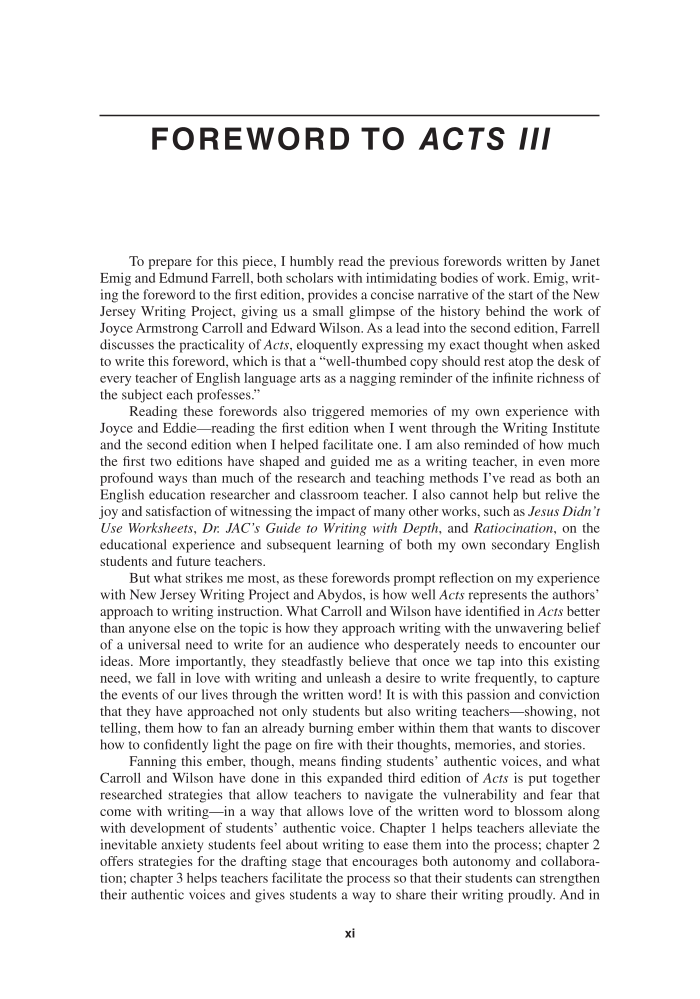xi FOREWORD TO ACTS III To prepare for this piece, I humbly read the previous forewords written by Janet Emig and Edmund Farrell, both scholars with intimidating bodies of work. Emig, writ- ing the foreword to the first edition, provides a concise narrative of the start of the New Jersey Writing Project, giving us a small glimpse of the history behind the work of Joyce Armstrong Carroll and Edward Wilson. As a lead into the second edition, Farrell discusses the practicality of Acts, eloquently expressing my exact thought when asked to write this foreword, which is that a “well-thumbed copy should rest atop the desk of every teacher of English language arts as a nagging reminder of the infinite richness of the subject each professes.” Reading these forewords also triggered memories of my own experience with Joyce and Eddie—reading the first edition when I went through the Writing Institute and the second edition when I helped facilitate one. I am also reminded of how much the first two editions have shaped and guided me as a writing teacher, in even more profound ways than much of the research and teaching methods I’ve read as both an English education researcher and classroom teacher. I also cannot help but relive the joy and satisfaction of witnessing the impact of many other works, such as Jesus Didn’t Use Worksheets, Dr. JAC’s Guide to Writing with Depth, and Ratiocination, on the educational experience and subsequent learning of both my own secondary English students and future teachers. But what strikes me most, as these forewords prompt reflection on my experience with New Jersey Writing Project and Abydos, is how well Acts represents the authors’ approach to writing instruction. What Carroll and Wilson have identified in Acts better than anyone else on the topic is how they approach writing with the unwavering belief of a universal need to write for an audience who desperately needs to encounter our ideas. More importantly, they steadfastly believe that once we tap into this existing need, we fall in love with writing and unleash a desire to write frequently, to capture the events of our lives through the written word! It is with this passion and conviction that they have approached not only students but also writing teachers—showing, not telling, them how to fan an already burning ember within them that wants to discover how to confidently light the page on fire with their thoughts, memories, and stories. Fanning this ember, though, means finding students’ authentic voices, and what Carroll and Wilson have done in this expanded third edition of Acts is put together researched strategies that allow teachers to navigate the vulnerability and fear that come with writing—in a way that allows love of the written word to blossom along with development of students’ authentic voice. Chapter 1 helps teachers alleviate the inevitable anxiety students feel about writing to ease them into the process chapter 2 offers strategies for the drafting stage that encourages both autonomy and collabora- tion chapter 3 helps teachers facilitate the process so that their students can strengthen their authentic voices and gives students a way to share their writing proudly. And in
Document Details My Account Print multiple pages
Print
You have printed 0 times in the last 24 hours.
Your print count will reset on at .
You may print 0 more time(s) before then.
You may print a maximum of 0 pages at a time.












































































































































































































































































